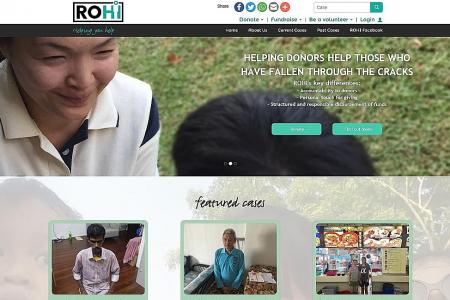Code of Practice to regulate online giving
Code may encourage more donations by ensuring cases are real, say platforms
Four crowdfunding platforms have welcomed a new code of practice that aims for greater transparency and accountability in fund-raising.
The platforms - Give.Asia, Giving.sg, Ray of Hope Initiative and Simply Giving - said they will adopt the code that they developed together with Commissioner of Charities Ang Hak Seng.
They said the code, which Dr Ang has said will help to build a safer online giving environment, could encourage more people to donate because they can now do so with peace of mind.
Ray of Hope Initiative's executive director Sharmin Foo said: "As crowdfunding grows, the code is important because it helps to ensure that the causes people give to are genuine."
Minister for Culture, Community and Youth Grace Fu launched the Code of Practice for Online Charitable Fundraising yesterday at a forum organised by the National Volunteer and Philanthropy Centre (NVPC).
The code applies to fund-raisers, including charities and individuals seeking donations, and the online platforms used by them. Breaches can lead to a fine of up to $5,000 or up to a year's jail, or both.
Ms Fu said the code is timely because online fund-raising has grown in recent years. In 2016, 28 per cent of Singaporeans made donations online compared with 8 per cent in 2014, she added, citing surveys by the NVPC.
Concerns have been raised that individuals who turn to crowdfunding for help may give inaccurate or incomplete information about themselves to try to get more donations.
I hope more people will go through platforms like ours instead of seeking donations on their own. It helps build the culture of informed giving.Ray of Hope Initiative executive director Sharmin Foo
Under the new code, those seeking help must declare that they are aware of and will abide by fund-raising regulations, which include giving accurate information to donors and maintaining proper records of donations received.
The crowdfunding platforms must also assess the legitimacy of appeals by verifying the identity of fund-raisers and the needs of beneficiaries.
"They will also ensure transparency on funds raised by providing regular updates as well as providing information on fees charged," Ms Fu said.
"Donors must also do their part to hold fund-raisers accountable, by asking questions on the bases of the appeal before exercising their generosity. This underscores the need for co-regulation, where everyone has a part to play in encouraging safer online giving."
She said the four platforms are working towards complying with the code by the first half of the year.
Charity Council chairman Gerard Ee said the code is meant to protect the public.
"Online giving works wonderfully because people have easy access and this convenience does facilitate donation," he added.
"However, there has to be guidelines and expectations that provide for some order. Still, the guidelines also must not be so overpowering that they stifle the giving."
Give.Asia co-founder Aseem K. Thakur said the code "brings more transparency and trust to the online giving space".
The platform, which raised $11.2 million in donations last year, does due diligence by visiting beneficiaries and has a community of donors and non-profit partners that will report suspicious campaigns, he said.
Ray of Hope Initiative's Ms Foo said it makes checks such as identifying the beneficiary and finding out what assistance he is getting, and that the code will make such expectations clearer to fund-raisers and ensure their legitimacy.
"I hope more people will go through platforms like ours instead of seeking donations on their own. It helps build the culture of informed giving," she added.
Get The New Paper on your phone with the free TNP app. Download from the Apple App Store or Google Play Store now


